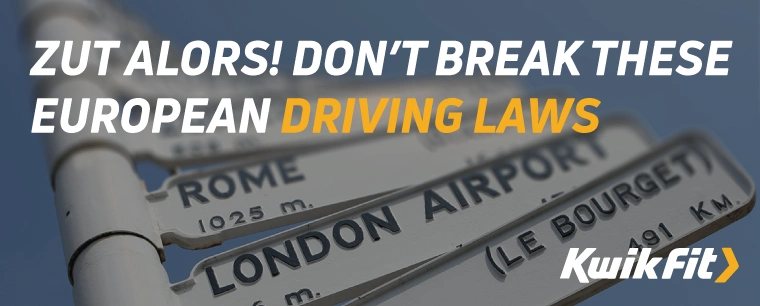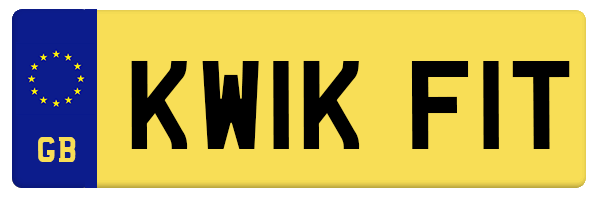Zut Alors! Don't Break These Laws: European Driving Laws
Jack Dreyer | Monday 15th July 2024 12:30pm

Planning a trip to Paris? If you’re taking your own car, you’d better make sure it’s not too old! In a bid to cut air pollution and traffic in the capital, French authorities have banned the use of old cars on the streets of Paris during peak times on weekdays.
This law, which took effect on Friday 1st July 2016, means that any car registered before 1st January 1997 will not be allowed in the city centre from 8 am to 8 pm. Otherwise, drivers will face a fine of €35 Euros. There are exceptions for cars registered as classic cars. But you might want to think again about taking the trusted family workhorse: the Volvo 850.
France isn’t the only European country with differing transport laws from the UK; driving on the continent can be quite a departure from driving in the UK – and we're not just talking about driving on the other side of the road. With an estimated 2 million Brits planning to head abroad this summer, many of them taking their own car or using a hire car, it’s important to familiarise yourself with the local road laws of the country you’re visiting if you want to avoid penalties.
Read on to find out about the European driving laws you just might not have known about.
1. You don’t need a GB sticker if you have an EU number plate
Most people know that if you intend to take your car overseas and into Europe, you need to make sure you have a GB sticker on the rear of the vehicle.
Failure to comply can result in an on-the-spot fine. However, what you may not have known is that if your car has a new-style EU number plate with the GB and the European flag displayed on the left-hand edge, this replaces the need for a GB sticker as your vehicle is already marked as being from the UK.
If you have a new style EU number plate, it will look a little something like this:

Even though the UK has left the EU, the rules still apply to licence plates. Find out more about driving with certain licence plates in Europe on the GOV.UK website here.
Another important note here is that the style of GB sticker has also changed since we left the EU. If it’s been a while since you’ve been to the continent, double check that your rainy-day stickers are still valid.
2. Pack a breathalyser when in France
Since 2012, it has been compulsory for all drivers (except moped users) to carry a self-test breathalyser in their vehicle while travelling in France.
Furthermore, you can’t just use any old breathalyser; it has to be certified by the French authorities, showing an ‘NF’ number. If you’re using a breathalyser from a previous trip to France, you should also make sure that it hasn’t reached its expiry date. This depends on the type of breathalyser used; police breathalysers are extremely expensive so that they can be accurate and reusable, but single-use consumer breathalysers have a surprisingly short shelf life and digital breathalysers will need recalibration after around 12 months from first use.
While the French government announced that drivers not carrying a breathalyser would face a fine of €11, this has since been postponed indefinitely. Instead, drivers found without breathalysers will merely be “reminded of the law”.
So, technically, you still need to make sure you carry a breathalyser in the car when in France, but there is no fine currently in place for non-compliance. However, expect a severe dressing down from a French police officer and a delay to your journey if you don’t have the necessary kit. It’s also extremely easy to get your hands on one – any train or ferry terminal and almost all fuel stations on the Kent coast, for example, sell complete “EU Kits” with everything you’ll need.

3. Check your insurance before you travel
If you have fully comprehensive insurance cover on your car, don’t just assume that you’ll have the same level of cover when you go abroad.
In many cases, when not driving in the UK, your level of cover will drop to the ‘third-party’. This means that if you’re involved in a road accident, this will only cover other parties involved and not damage to your own car.
Make sure you contact your insurance company before you travel; you can usually increase your level of European cover for a small fee – and you might find that they do in fact provide full cover for a certain period abroad.
4. Speed limits are ‘weather-permitting’ on French roads
In the UK, variable speed limits are common on motorways when there has been an incident of some sort.
However, did you know that, in France, the speed limit automatically changes depending on the weather? When it rains or snows, the speed limit for motorways changes as follows:
- From 130 km/h to 110 km/h
- From 110km/h to 100km/h on dual carriageways
- And from 90 km/h to 80 km/h on rural roads.
When visibility is less than 50 metres due to fog, the speed limit on all French roads drops to 50 km/h so make sure you ease off the gas when bad weather comes in.
The weather isn’t the only thing that affects the speed limit in France. If you’re a new driver and have only had your licence for less than two years, the slower, rain-related speed limits apply at all times.
5. Lay off the horn
If you’re tempted to give other road users or pedestrians a piece of your mind, think twice before you lean on the horn. Using your car’s horn in built-up areas of many European countries for anything other than to warn others of an accident is actually illegal.
The rules for using the horn are some of the most varied depending on the country of travel. In countries like Spain and Denmark, horns are prohibited at any time in urban areas whereas in Portugal and Turkey the rules only apply during hours of darkness. In Austria, it is illegal to use your horn outside a hospital and using a car horn is entirely banned in Vienna!
6. Keep a second pair of glasses handy in Spain
The law in the UK states that you must be able to read a licence plate at a distance of 20.5 metres. If you need glasses in order to achieve this, you must always wear them when driving. However, in Spain and France, the law also states that if you wear glasses and require corrective lenses to drive you must have a second spare pair in the vehicle in case one set gets broken.

7. Switch your lights on in Sweden
In Scandinavian countries such as Sweden where daylight hours are limited during the winter, it is a legal requirement to keep your lights on all the time, even in the middle of the day during summer.
Swedish vehicle manufacturers combat this law by producing vehicles with permanent daytime running lights but this feature is also present on models sold in the UK. So, if you ever pass a Volvo in the middle of the day and wondered why they have their headlights on, now you know.
8. Keep your car clean, but not on a Sunday
Some European driving laws are stranger than others, but perhaps the most surprising can be found in Belarus where it is actually illegal to drive a dirty car! It’s unclear as to what exactly constitutes a dirty car but you can apparently be landed with a hefty fine. So, make sure you keep your vehicle clean at all times, that is, unless you’re going to Switzerland where it is against the law to clean your car on a Sunday!
Kwik Fit are here to help
With so many extra variables to consider when on the road in Europe, you will want to make sure your car is also running reliably. It's always a good idea to service your car or even combine servicing with an MOT so you don't break down in another country.
The expert technicians at our branches all around the country are always on hand to help with anything from a courtesy check to complete repair work. In the meantime, for more driving advice, keep up with our blog.
Any facts, figures and prices shown in our blog articles are correct at time of publication.
Featured Articles
Is it Illegal to Drive With One Headlight?
Saturday 19th July 2025
Wondering if it’s illegal to drive with one headlight? Learn about the safety risks and penalties of illegal blown bulbs and why you should fix them promptly.
Air Con in EVs & Hybrids: Experts Answer Your Questions
Monday 30th June 2025
Does air con drain EV batteries? Can you use the air con while charging an electric car? Find out the answers to these questions & more from Kwik Fit’s experts.
Why Is Your Car Making a Noise? Fixes & Tips
Friday 13th June 2025
When your car starts making unexpected noises, it can certainly be quite disconcerting; it may be nothing to worry about, but here’s what you need to know.









